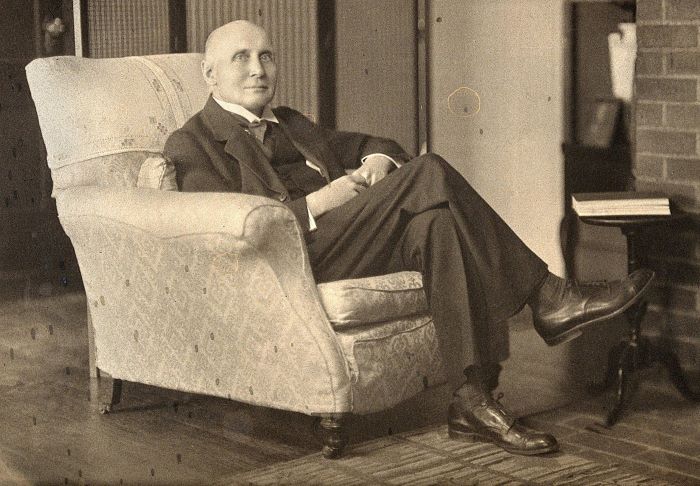- About MAA
- Membership
- MAA Publications
- Periodicals
- Blogs
- MAA Book Series
- MAA Press (an imprint of the AMS)
- MAA Notes
- MAA Reviews
- Mathematical Communication
- Information for Libraries
- Author Resources
- Advertise with MAA
- Meetings
- Competitions
- Programs
- Communities
- MAA Sections
- SIGMAA
- MAA Connect
- Students
- MAA Awards
- Awards Booklets
- Writing Awards
- Teaching Awards
- Service Awards
- Research Awards
- Lecture Awards
- Putnam Competition Individual and Team Winners
- D. E. Shaw Group AMC 8 Awards & Certificates
- Maryam Mirzakhani AMC 10 A Awards & Certificates
- Two Sigma AMC 10 B Awards & Certificates
- Jane Street AMC 12 A Awards & Certificates
- Akamai AMC 12 B Awards & Certificates
- High School Teachers
- News
You are here
Quotations in Context: Whitehead
“Everything of importance has been said before
by somebody who did not discover it.”
Another Quotations in Context column addresses a quotation from James Joseph Sylvester’s Presidential Address in 1869 to the Mathematical and Physical Sciences Section of the British Association for the Advancement of Science. In 1916, Alfred North Whitehead gave his own Presidential Address to this same institution. The topic of his speech was “The Organisation of Thought.”

Photograph of Whitehead. Public domain, courtesy of Wellcome Collection.
The first half of his address was about the nature of science. Whitehead discussed the practical and theoretical sides of science, the discipline’s use of inductive reasoning and experience, and its foundation in common sense. In the end, he concluded:
Science is essentially logical. The nexus between its concepts is a logical nexus, and the grounds for its detailed assertions are logical grounds. King James said, 'No bishops, no king.' With greater confidence we can say, 'No logic, no science' [Whitehead 2007a].
The speech briefly turned to those who viewed logical thought as barren or sterile. He mentioned the belief that deductive reasoning could not create new ideas, since any conclusions came part and parcel with the premises with which one began. Whitehead offered a brief rebuttal to this characterization, but he then moved on, although he would address this topic again later in the speech.
Whitehead gave a brief overview of modern logic, dividing it into four general sections, which he termed arithmetic, algebra, general-function theory and analytic. The arithmetic section involved general propositions, while the algebra section introduced propositional functions. The general-function theory section then considered classes of propositional functions. The final section, the analytic stage, Whitehead concluded as being the “whole of mathematics . . . neither more nor less” [Whitehead 2007b].
The quotation in question for this column appeared immediately following this summary and categorization of logical thought, when Whitehead returned to the idea of the barrenness of logic:
The question arises, How many forms of propositions are there? The answer is, an unending number. The reason for the supposed sterility of logical science can thus be discerned. Aristotle founded the science by conceiving the idea of the form of a proposition, and by conceiving deduction as taking place in virtue of the forms. But he confined propositions to four forms, now named A, I, E, O. So long as logicians were obsessed by this unfortunate restriction, real progress was impossible. Again, in their theory of form, both Aristotle and subsequent logicians came very near to the theory of the logical variable. But to come very near to a true theory, and to grasp its precise application, are two very different things, as the history of science teaches us. Everything of importance has been said before by somebody who did not discover it [Whitehead 2007b].
I have occasionally found Whitehead’s quotation being misinterpreted as equivalent to Stephen Stigler’s “law of eponymy.” But in the context of the original address, Whitehead clearly seems to be saying the exact opposite: that the first person to state a result or make a claim is rarely the first person to truly understand the idea precisely and completely.
References
Whitehead, Alfred North. 2007a, April. A. N. Whitehead addresses the British Association in 1916, Part 1. MacTutor History of Mathematics Archive.
Whitehead, Alfred North. 2007b, April. A. N. Whitehead addresses the British Association in 1916, Part 2. MacTutor History of Mathematics Archive.
“Quotations in Context” is a regular column written by Michael Molinsky that has appeared in the CSHPM/SCHPM Bulletin of the Canadian Society for History and Philosophy of Mathematics since 2006 (this installment was first published in November 2008). In the modern world, quotations by mathematicians or about mathematics frequently appear in works written for a general audience, but often these quotations are provided without listing a primary source or providing any information about the surrounding context in which the quotation appeared. These columns provide interesting information on selected statements related to mathematics, but more importantly, the columns highlight the fact that students today can do the same legwork, using online databases of original sources to track down and examine quotations in their original context.
Michael Molinsky (University of Maine at Farmington), "Quotations in Context: Whitehead," Convergence (February 2023)




